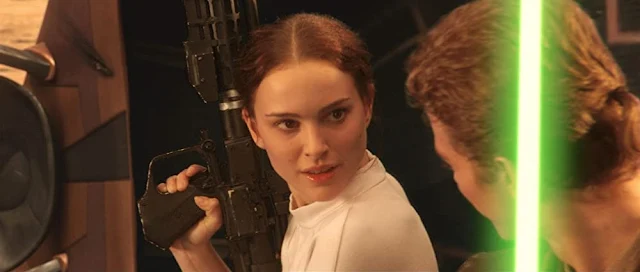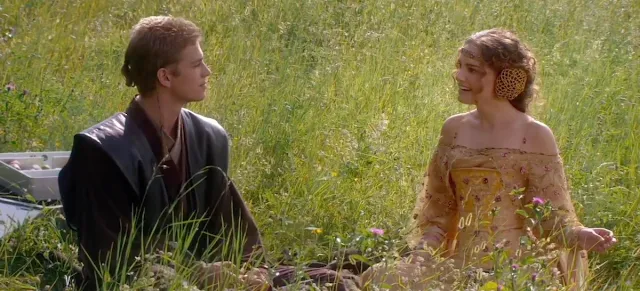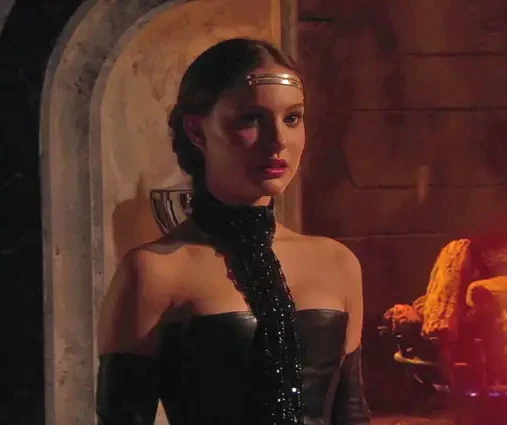From the duality of morality and power to the intricacies of love and destiny, "Attack of the Clones" is more than just a space opera; it is a thematic labyrinth that invites its audience to ponder questions that are both timeless and urgently contemporary.
This essay aims to delve into these themes, unraveling the layers of complexity that make this installment a pivotal narrative in the Star Wars universe that rings across the entire saga. The focus will be on four major themes: the theme of duality, the corruption of power, love and destiny, and the tension between the individual and the collective.


The Theme of Duality
One of the most compelling themes in "Attack of the Clones" is the concept of duality, which manifests in various forms throughout the film. This theme serves as a narrative device that not only enriches the characters but also adds layers of complexity to the political and moral landscape of the Star Wars universe.Moral Ambiguity
The characters in "Attack of the Clones" are not mere archetypes; they embody a range of moral complexities that make them relatable and human. Anakin Skywalker, for instance, is torn between his duty as a Jedi and his personal desires, epitomizing the duality of light and dark within himself. Similarly, Count Dooku, once a Jedi, now a Sith, represents the thin line between good and evil, challenging the audience's preconceived notions about morality.
Political Duality
The political landscape in the film also serves as a battleground for duality. On one side is the Galactic Republic, symbolizing order and governance, and on the other are the Separatists, representing chaos and rebellion. However, as the plot unfolds, it becomes evident that both sides are manipulated by a single entity—Emperor Palpatine—blurring the lines between good and bad, right and wrong.
Personal Duality
The theme of duality in Star Wars extends to the personal lives of the characters as well. Padmé Amidala, a senator and former queen, grapples with her dual roles as a political leader and a woman in love. Her struggle to reconcile these two aspects of her identity adds depth to her character and reflects the broader theme of duality that runs through the film.
The theme of duality in Star Wars extends to the personal lives of the characters as well. Padmé Amidala, a senator and former queen, grapples with her dual roles as a political leader and a woman in love. Her struggle to reconcile these two aspects of her identity adds depth to her character and reflects the broader theme of duality that runs through the film.
The Dual Nature of the Force
The Force itself, a central element in the Star Wars saga, is inherently dualistic, comprising the Light and Dark sides. This duality serves as a metaphor for the internal and external conflicts faced by the characters. The Jedi, who are supposed to bring balance to the Force (in a sense), find themselves embroiled in a war that challenges their very principles, adding another layer to the film's exploration of duality.
The Corruption of Power
The theme of power and its corrupting influence is another cornerstone of "Star Wars: Episode II – Attack of the Clones." This theme is intricately woven into the fabric of the film's narrative, serving as a cautionary tale that resonates with real-world implications.The Fall of Democracy
The Galactic Senate, once a symbol of democratic governance, becomes a stage for the erosion of democracy itself. As Senator Palpatine manipulates the political system to gain emergency powers, the film subtly critiques how easily democratic institutions can be subverted. This theme is especially poignant in the context of the Republic's transition into the Galactic Empire in later episodes, illustrating the fragility of democratic systems when faced with charismatic but authoritarian leaders.
The Abuse of Technology
"Attack of the Clones" also delves into the ethical implications of technological advancements, particularly through the creation of the Clone Army. The clones, bred to be perfect soldiers, raise questions about the morality of using technology to create life solely for the purpose of warfare. This theme is further emphasized by the droid armies of the Separatists, highlighting how technology can be weaponized to serve the interests of those in power.
The Seduction of Power
Characters like Anakin Skywalker and Count Dooku serve as case studies in the corrupting influence of power. Anakin's desire for power to protect his loved ones sets him on a path that eventually leads to his transformation into Darth Vader. Count Dooku, a former Jedi, is seduced by the Dark Side's promise of power, becoming a pawn in Palpatine's grand scheme. Their journeys underscore the dangers of unchecked ambition and the ethical compromises that often accompany the pursuit of power.
The Moral Cost of War
The onset of the Clone Wars serves as a backdrop for exploring the moral cost of wielding power. The Jedi, traditionally peacekeepers, are thrust into the role of generals, leading armies into battle. This shift challenges their ethical principles and sets the stage for their eventual downfall, serving as a grim reminder of the corrupting nature of power, even for those with the best intentions.
Love and Destiny
The theme of love and destiny is intricately woven into the narrative of "Star Wars: Episode II – Attack of the Clones," serving as both a driving force and a tragic flaw for the characters involved. This theme adds emotional depth to the film and contributes to its complexity.Forbidden Love Across the Stars
The love story between Anakin Skywalker and Padmé Amidala is one of the central narratives of the film. Their love, though passionate, is forbidden by the Jedi Code, which prohibits attachments. This tension between love and duty adds a layer of complexity to both characters, as they struggle to reconcile their feelings with their responsibilities. Their love becomes both a source of strength and a vulnerability, setting the stage for future tragedies in the saga.
 |
| Two star crossed lovers |
The Inescapability of Destiny
Anakin's love for Padmé is closely tied to his sense of destiny. As the prophesied Chosen One, Anakin believes he is destined for greatness, a belief that fuels his actions throughout the film. However, his attempts to control his destiny—especially his desire to prevent Padmé's death, as foreseen in his visions—lead him down a dark path. This theme explores the paradox of destiny: the more one tries to control it, the more elusive it becomes.
Anakin's love for Padmé is closely tied to his sense of destiny. As the prophesied Chosen One, Anakin believes he is destined for greatness, a belief that fuels his actions throughout the film. However, his attempts to control his destiny—especially his desire to prevent Padmé's death, as foreseen in his visions—lead him down a dark path. This theme explores the paradox of destiny: the more one tries to control it, the more elusive it becomes.
Love as a Catalyst
The love between Anakin and Padmé serves as a catalyst for many of the film's events. It pushes Anakin to question the Jedi Code and even break it, setting him on the path to becoming Darth Vader. Similarly, Padmé's love for Anakin blinds her to his darker tendencies, leading her to make choices that have far-reaching consequences. Their love story serves as a cautionary tale about the dangers of love when it becomes an obsession rather than a partnership.
The Role of Choice
While destiny plays a significant role in the film, the theme of choice is equally important. Characters are often presented with choices that test their morals and desires. Anakin's choice to pursue his love for Padmé, despite the risks, is a pivotal moment that shapes his destiny and the future of the galaxy. This theme adds a layer of agency to the characters, emphasizing that while destiny may set the stage, it is the choices they make that determine the outcome.
 |
| Check out this foreshadowing of destiny... |
The Individual vs. The Collective
The tension between individual agency and collective responsibility is a recurring theme in "Star Wars: Episode II – Attack of the Clones." This theme serves as a lens through which the film examines the ethical and moral dilemmas faced by its characters, particularly in the context of war and governance.The Jedi Order
The Jedi, traditionally peacekeepers and guardians of the galaxy, find themselves in a new role as generals leading the Clone Army. This shift raises ethical questions about the role of the individual Jedi in the context of the collective Jedi Order. Should they adhere to their personal beliefs and principles, or should they follow the collective decision of the Order, even if it contradicts their own moral compass?
This tension becomes evident in characters like Obi-Wan Kenobi, who grapples with the Order's involvement in the war despite his own reservations.
The Clone Army
The clones, bred for the sole purpose of serving as soldiers, represent the extreme loss of individuality in the face of collective needs. They are literally manufactured to be identical, stripping them of individual agency. Yet, as the series progresses, it becomes clear that each clone possesses a unique personality, raising ethical questions about the morality of using them as mere tools for war. Their existence serves as a stark reminder of the dehumanizing effects of prioritizing the collective over the individual.
The Galactic Republic
The Galactic Republic, a collective governing body, faces its own set of ethical dilemmas. As it transitions into a militarized state, individual planets and their representatives in the Senate must decide whether to prioritize their own interests or the collective good. This theme is exemplified by characters like Padmé Amidala, who must navigate her responsibilities as a senator representing her planet's interests while also considering the broader implications for the Galactic Republic.
Personal Sacrifice for Collective Gain
The theme also manifests in the personal sacrifices that characters make for the greater good. Anakin's struggle with his personal desires versus his responsibilities as a Jedi is a prime example. His journey reflects the broader ethical dilemma of whether the needs of the many should always outweigh the needs of the few...
Conclusion
"Star Wars: Episode II – Attack of the Clones" is often seen as a bridge between the introduction of The Phantom Menace and climax of the prequel trilogy, but to view it merely as a transitional film would be to overlook its thematic richness. The film serves as a microcosm of the human experience, encapsulating the complexities of love, the seductive nature of power, the tension between individuality and collectivism, and the ever-present duality in morality and politics.What sets "Attack of the Clones" apart is its willingness to delve into the gray areas of these themes, refusing to offer easy answers. It challenges the viewer to confront uncomfortable truths about the corruptibility of democratic institutions, the ethical implications of technological advancements, and the paradoxical nature of destiny.
The film doesn't just present these themes; it intertwines them, creating a complex narrative tapestry that reflects the interconnectedness of these human dilemmas. For instance, the theme of duality is not just a characteristic of individual characters but is mirrored in the political landscape, the moral choices, and even in the nature of the Force itself. This interconnectedness serves as a poignant reminder that our personal choices often have far-reaching implications, affecting not just ourselves but the world around us.
Moreover, the film serves as a cautionary tale for contemporary society. In an era where the erosion of democratic values, the ethical dilemmas posed by technological advancements, and the complexities of human relationships are more relevant than ever, "Attack of the Clones" offers a mirror to our own world. It invites us to question, to challenge, and to introspect, urging us to be vigilant stewards of our own destinies and the societies we inhabit.
Moreover, the film serves as a cautionary tale for contemporary society. In an era where the erosion of democratic values, the ethical dilemmas posed by technological advancements, and the complexities of human relationships are more relevant than ever, "Attack of the Clones" offers a mirror to our own world. It invites us to question, to challenge, and to introspect, urging us to be vigilant stewards of our own destinies and the societies we inhabit.















